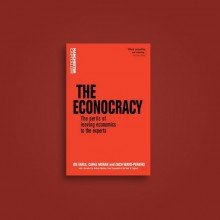There is a new word in town. It is called ‘Econocracy’. The aim is to create the impression that the economy is too difficult to understand and that it should be left to ‘experts’. ‘Leave it to the government as only they understand its complexities’.
However, with a country riddled with debt (approx 3 trillion incl of personal debt) largely thanks to a Chancellor whose academic background was in Modern History it is probably not surprising that many other folk believe they should have their input heard.
Manchester University have sought to apply a critical eye over the teaching of economics across the country but more specifically in their own economics department and they have come up with some fascinating findings.
Key findings:
- Economics education at Manchester has elevated one economic paradigm, often called neoclassical economics, to the sole object of study. Other schools of thought such as institutional, evolutionary, Austrian, post-Keynesian, Marxist, feminist and ecological economics are almost completely absent.
- The consequence of the above is to preclude the development of meaningful critical thinking and evaluation. In the absence of fundamental disagreement over methodology, assumptions, objectives and definitions, the practice of being critical is reduced to technical and predictive disagreements. A discipline with a broader knowledge of alternative perspectives will be more internally self-critical and aware of the limits of its knowledge. Universities cannot justify this monopoly of one economic paradigm.
- The ethics of being an economist and the ethical consequences of economic policies are almost completely absent from the syllabus.
- History of economic thought is an optional third year module which students are put off taking due to it requiring essay writing skills that have not been extensively developed elsewhere in the degree. Very little economic history is taught. Students finish an economics degree without any knowledge of momentous economic events from the Great Depression to the break-up of the Bretton Woods Monetary System.
- When taken together, these points mean that economics students are taught the economic theory of one perspective as if it represented universally established truth or law.
- This state of affairs violates the University’s own guidelines for undergraduateeducation at Manchester. The Manchester Matrix sets out the knowledge and skills the University expects graduates to have. To take just one example, it states thatuniversity education should ‘prepare graduates for citizenship and leadership in diverse, global environments’. In a discipline such as economics this seemsparticularly relevant, and yet social, political and philosophical issues are divorced from the discipline and are removed to optional modules in other departments. Pure economics students are encouraged not to take these modules as they are seen as less valuable.
- Syllabuses are almost homogenous at many English universities. Widespread support for our society in Manchester and the emergence of similar societies at ten universities around the country shows that many are frustrated with the current situation.
- Fifteen years ago the Economics Department at Manchester was pluralist and alternative perspectives and economic history had a far greater place on the syllabus. Since then academics that research in alternative perspectives have been marginalised within the department and aren’t replaced on a like for like basis when they retire or leave.
- A significant cause of this great narrowing is how research funding (REF) in economics is allocated. The journals that are highly ranked espouse a neoclassical perspective and as a result universities like Manchester, whose central aim is to climb the research rankings, will only hire academics that adhere to this school of thought. The prioritisation of research over all else means that many university economics departments have become closed shops to economists who do not follow this prescribed agenda, regardless of the positive impact they could have on teaching and understanding.
- A range of graduate employers of economists support calls for a more pluralist and critical education. The Government Economics Service, the largest employer of graduate economists, advises applicants against a ‘dogged adherence to… a set of axiomatic rules for theoretic consistency’. Instead it looks for candidates that are ‘intellectually pluralistic’.Multiple employers including as the Bank of England and the big-four accountancy firms are similarly calling for better-equipped economic graduates.
These points combine to make a compelling case for significant reform.
In conclusion, the University must ensure that the academic environment within the Economics Department is open and representative of the diversity of economics. This is the only way we can produce economists of the calibre needed to face approaching economic challenges. The cost of maintaining the status quo is too high. Economics, Education and Unlearning
What we require is a return to a pluralism within education that explores ideas and then democratises students to make up their own minds. We appear to becoming increasingly instrumentalist with servicing the economy now much more important than discovery and real thinking. Perhaps we could have avoided this economic mess if we had not herded students in to a neo liberal pen.
Time for a change of direction before the education system fully embraces exsanguination as the status quo.
Douglas James







